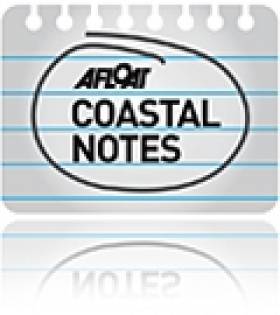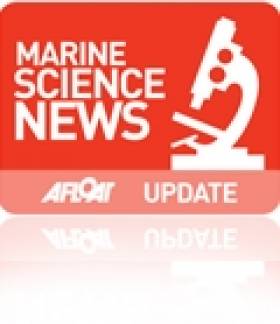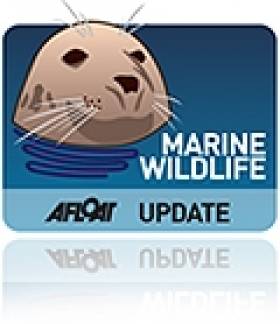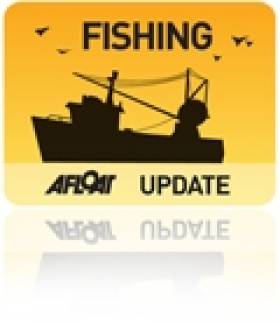Displaying items by tag: marine environment
Pollock Holes Are 'Eighth Wonder Of The World' Says Kilkee Diver
#PollockHoles - Kilkee personality Manuel Di Lucia takes The Irish Times's Lorna Siggins on a tour below the depths to see the renowned Pollock Holes, a unique marine environment on the Irish coastline that he believes deserves special protection.
The collection of tidal ponds in the reef off Kilkee in Co Clare have been described as a "rich ecological resource" and by local diving enthusiast and restaurateur Di Luca as 'the eighth wonder of the world'.
But while the National Parks and Wildlife Service confirms that the pools are within the Special Area of Conservation designated for Kilkee's reefs, De Lucia says there is nothing to stop anyone poaching shellfish for commercial purposes.
The Irish Times has more on the story HERE.
#Marine - Local primary school teachers in Galway have just finished a week-long training course (1-5 July) on how to incorporate marine studies into their schools through fun activities and projects.
Sea for Society (EU FP7 project) research last year across a number of EU countries found that ‘ignorance’ and ‘lack of understanding’ are key barriers to the development of a sustainable marine ecosystem.
The Marine Institute and Galway Atlantaquaria tackled this barrier by introducing teachers to their local seashore, using it as a unique teaching resource.
“Through the Explorers Education Programme and teachers' training course, we provide an opportunity for teachers to learn about their local seashore as well develop an understanding about the importance of Ireland’s marine resource and ocean wealth,” said the Marine Institute's Cushla Dromgool-Regan.
Offering a wide range of cross-curricular activities involving science, mathematics, English, geography, history and art, the programme is intended to help teachers feel more confident and enabled to innovate and inspire students in learning about the marine.
”The Explorers' annual teacher’s training course has been run through the Galway Education centre for nearly eight years and continues to be popular with teachers, booking up early each year," Dromgool-Regan added.
One of the teachers on the most recent course, Bróna Smyth of Scoil Mhuire in Maree, said it was "invaluable in offering practical concepts that can be used on the seashore and in class by interlinking the subjects.
"The hands-on approach, learning about species and seaweeds, making seashore keys, collecting marine litter data for graphs, completing water experiments to creating seashore poetry and stories are all key to embedding the understanding of how important the ocean is and how it impacts our daily lives.”
Primary school teaching materials relating to the seashore and marine are available through the Explorers Education Programme at www.explorers.ie.
Algal Bloom On East Coast Beaches Under Observation
#AlgalBloom - The Marine Institute says it is currently monitoring an algal bloom on beaches on the east coast of Ireland as a part of its Phytoplankton Monitoring programme.
The bloom was detected two weeks ago using satellite images and information provided by the Environmental Protection Agency (EPA) and Wexford County Council.
The Marine Institute has analysed a number of samples from the algal bloom and has identified the species as Phaeocystis pouchetii, a common species that has caused blooms along the east coast several times in previous years. The species causes discolouration of the water, and foaming on the beach in windy conditions.
Joe Silke of marine environment and food safety services at the Marine Institute emphasised that the species is not directly harmful to humans either through swimming or from consuming fish that have been exposed to the bloom.
Beaches remain safe despite any discolouration of water, though the production of foam, and in some extreme cases anoxia, can result in marine organism mortalities.
However, unlike last summer's destructive algal bloom on the west and north coasts that was responsible for significant fish and shellfish kills from Galway to Donegal, fish mortalities caused by this particular species in previous Irish blooms have not been observed, as wild fish tend to avoid the bloom. This may explain the low catches reported by sea anglers on the east coast in recent weeks.
Several fishermen have also reported clogging of nets in recent weeks, which may be caused by the decaying bloom sinking to the seafloor.
Algal blooms are commonly detected over the summer months in coastal areas. It is likely that this particular bloom will dissipate in in the next week or so and will be replaced with the normal succession of microalgae that form the bottom of the food chain in the sea.
Study of NI Waters Shows Cod, Whiting at Lowest Levels
A new study of Northern Ireland's waters has found that stocks of cod and whiting are at their lowest ever recorded levels.
The Northern Ireland State of the Seas report, launched by NI environment minister Edwin Poots and agriculture minister Michelle Gildernew, showed that while herring and haddock stocks are improving, some species remain "seriously depleted", according to the Belfast Telegraph.
"This is a key time in managing our marine environment," said minister Poots. "We have an extremely rich and varied coastline with the marine species in our seas contributing to over half the overall biodiversity in Northern Ireland."
The report also evaluates the potential of other marine resources such as tourism, beaches, shipwrecks and renewable energy - all of which will contribute to new planning laws covering the marine environment.
The Belfast Telegraph has more on the story HERE.































































